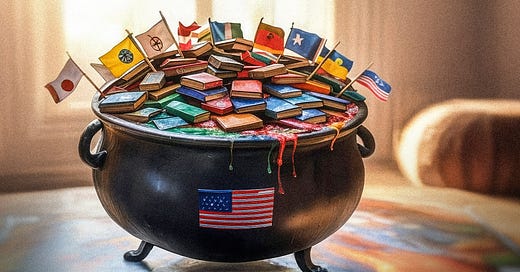Americans elected Donald Trump because they were tired of being despised by their own leaders. The real estate billionaire has his flaws, but at a time when politicians left and right were calling the country sexist, racist, lazy, and entitled, Trump called on Americans to Make America Great Again.
Now, as Trump’s second term begins with an impressive start, most of his supporters feel relieved to have a president who loves the country back in office. However, his early success raises larger questions. Greatness is tied to what Aristotle called telos — the ultimate purpose or end. To make America great, we must first answer the defining question of our time: Who are we?
Trump’s election marked a clear rejection of several ideas about national identity. Americans do not want to be “global citizens.” They want a distinct and sovereign nation. They do not want to live in a multicultural patchwork of segmented communities speaking different languages and celebrating different identities.
Americans reject the idea of acting as the world’s police force, sacrificing their sons and national resources to impose a global order that places their own country last. They do not want the United States to function as an office park or an economic zone. Instead of maximizing arbitrary economic measures like gross domestic product, they want a government that prioritizes the well-being of its people.
The American people are tired of leaders who belittle them for wanting a real nation — one that values its citizens above abstract economic statistics or globalist ideals. While Americans have clearly rejected progressive visions of identity, the question remains: Is there a unifying identity they can embrace?
An unrecognizable world
Rejecting multiculturalism, globalism, and economic essentialism is not enough. To make America great, conservatives and right-wing leaders must present an alternative identity — one that unites the nation and gives it a clear purpose.
This realization unsettles many conservatives, who have been conditioned to avoid discussions of identity for fear of being labeled extremists. That fear is understandable. Identity is powerful; it can inspire both great and terrible actions. It should not be taken lightly. However, conservatives cannot afford to abandon this conversation to Democrats and the political left. The question Who are we? will be answered — either by those willing to engage or by those who wish to redefine America entirely.
If conservatives retreat from this debate out of cowardice, they will find themselves living in a world shaped by their ideological opponents.
Is America merely a dream — an unattainable goal toward which the nation is always striving? Is it a set of ideas that anyone from anywhere can adopt and embrace? For decades, conservatives have promoted the idea of a “propositional nation” — one built on adherence to a set of principles rather than shared culture or heritage. With the failure of the multicultural globalist vision, many on the right now seek to return to this framework.
The problem is that this definition does not hold up to scrutiny.
The Liberia test
If America is merely an idea — a collection of abstract principles that anyone can adopt — then any society should be able to replicate those ideas and achieve the same results. There would be no need for immigrants to physically come to the United States or integrate with its people, because the location and the population would be irrelevant — only the principles would matter.
Yet history suggests otherwise. Liberia, for example, was founded as an African republic for freed slaves and freeborn black Americans. Its constitution mirrored the United States’ system, incorporating separation of powers, checks and balances, and a Bill of Rights. On paper, Liberia should have thrived under the same principles.
But reality tells a different story. Despite adopting America’s founding framework, Liberia has experienced persistent corruption and instability, ranking among the most corrupt nations in the world. Its struggles challenge the core assumptions of the propositional nation and raise a critical question: If America is just an idea, why can’t it be easily replicated?
The idea of a propositional nation falls apart when applied to domestic politics in the United States. The argument suggests that anyone who believes in America’s founding principles should be welcomed as a citizen. This assertion is rarely followed to its logical conclusion, however.
Consider Rep. Ilhan Omar (D-Minn.), a Somali immigrant serving in Congress who frequently criticizes the United States. Omar has repeatedly described the country that granted her asylum as racist and oppressive. She often addresses her supporters in Somali and has pledged to prioritize the interests of Somali immigrants — and, depending on the translation, Somalia itself.
Media reports have suggested that Omar’s second husband was actually her brother, allegedly part of an immigration fraud scheme. Despite this, there has been no serious effort to remove her from office or to revoke her citizenship.




I've come up with a great thing called the Liberia test. I didn't actually post any graphs or do research, I just named it and said some anecdotal stuff.
You can take the savage out of the jungle, but you can't take the savage out of the savage.